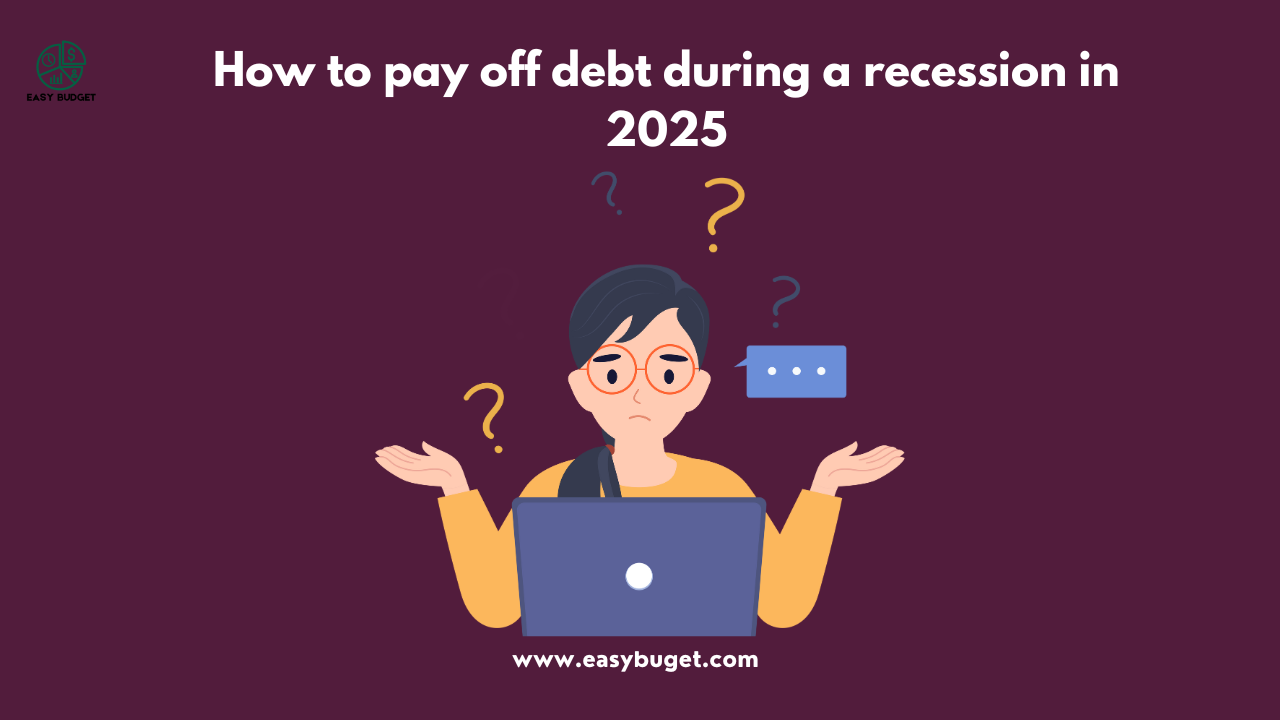Paying off debt during a recession can be a difficult task, but it’s not impossible. However with right strategic planning, consistent effort, and a willingness to adapt, you can navigate these challenges and emerge financially stronger. Here is a comprehensive guide to help you tackle debt effectively during tough economic times.
1. Assess Your Financial Situation Thoroughly
Understanding your financial reality is the foundation of any debt repayment plan.
Create a Comprehensive Debt Inventory
Include the following details for each debt:
- Total balance owed
- Interest rates (APR)
- Minimum monthly payments
- Loan terms (remaining duration)
- Fees or penalties for late payments
Review Your Credit Report
Check your credit report for accuracy and note all outstanding debts. Tools like AnnualCreditReport.com allow you to access your credit report for free.
Understand your financial behavior
Track your spending habits for at least a month to identify patterns. Look for unnecessary spending or areas where you can cut back.
2. Build a recession proof budget
A recession proof budget is all about prioritizing essentials and minimizing waste.
Use the 50/30/20 Rule
Allocate your income as follows:
- 50%: Essentials (housing, food, utilities)
- 30%: Discretionary spending (entertainment, dining out)
- 20%: Debt repayment and savings
use 50/30/20 rule calculator to calculate your budget.
If you are in heavy debt, aim to shift flexible funds toward repayment.
Adapt budgeting apps
Apps like Mint, YNAB (You Need a Budget), or EveryDollar can automate tracking and help you stick to your budget.
3. Choose a best debt repayment strategy
Debt consolidation loans
If you have good credit, consider consolidating high-interest debts into a single loan with a lower interest rate. This simplifies repayment and can reduce overall costs.
Balance transfer credit cards
For credit card debt, use a balance transfer card with a 0% introductory APR. Be alert when you transfer fees and ensure you can pay off the balance before the promotional period ends.
Hybrid approach
Combine the avalanche and snowball methods. Start with smaller balances for quick wins but prioritize high-interest debts simultaneously to save money.
4. Increase your income
Freelancing and remote work
The gig economy continues to thrive in 2025. Platforms like Upwork, Fiverr, and Toptal offer opportunities in writing, design, programming, and more.
Rent out assets
Monetize unused resources such as:
- Renting out a spare room or property on Airbnb
- Renting tools, vehicles, or equipment through sharing platforms
Passive income streams
Consider low-effort income options like investing in dividend-paying stocks, creating digital products, or affiliate marketing through a blog or social media.
5. Negotiate with creditors
Open communication with creditors can lead to favorable terms.
Seek temporary payment reductions
Explain your situation and request temporary payment reductions or deferments. Most lenders offer hardship programs during recessions.
Ask for interest rate reductions
Negotiating a lower interest rate can significantly reduce the total amount you owe over time.
Debt management plans (DMPs)
Work with a nonprofit credit counseling agency to negotiate lower interest rates and manageable payments through a structured plan.
6. Avoid pitfalls during a recession
Watch out for predatory lenders
Avoid payday loans or high-interest personal loans, which can trap you in a cycle of debt.
Beware of scams
During recession, fraudulent debt relief companies often prey on vulnerable individuals. Verify the legitimacy of any debt relief service before signing up.
Don’t overextend yourself
It’s tempting to take on side gigs or additional work during tough times. Ensure you’re not compromising your health or burning out.
7. Use community and government resources
Government assistance programs
Many governments offer relief programs during recession, such as housing subsidies, unemployment benefits, or healthcare assistance.
Nonprofit support
Organizations like the National Foundation for Credit Counseling (NFCC) provide free or low-cost advice and services.
Local initiatives
Community programs often provide access to food banks, utility payment assistance, and free financial workshops.
8. Automate Payments and savings
Automation simplifies your financial management:
- Set up automatic transfers to ensure bills are paid on time, avoiding late fees.
- Automate contributions to your emergency fund or savings account.
Use the “Round-Up” method
Link your debit card to savings apps that round up purchases to the nearest dollar and deposit the difference into a savings account.
9. Stay flexible and adaptable
Adjust your plan regularly
Reassess your budget and repayment plan every quarter. Adjust for changes in income, expenses, or economic conditions.
Stay informed
Monitor the economic environment and anticipate potential challenges. Staying proactive can prevent setbacks.
Set realistic goals
Aiming for small, achievable milestones can keep you motivated without feeling overwhelmed.
10. Seek professional advice
Financial Advisors
If you are unsure where to start, consult a financial advisor who specializes in debt management.
Debt attorneys
For complex situations, especially involving collections or lawsuits, legal advice may be beneficial.
Therapists or counselors
Money stress is real and can affect your mental health. Speaking with a therapist can help you manage financial anxiety.
11. Plan for the long term
While focusing on debt repayment, don’t lose sight of future financial security.
Diversify investments
Invest in a mix of assets, such as stocks, bonds, and real estate, to weather economic fluctuations.
Enhance job stability
Pursue certifications or training in recession-resistant industries like healthcare, education, or technology.
Continue building savings
Once debt-free, channel the same discipline into growing an emergency fund and investing for the future.
Conclusion
Paying off debt during a recession requires determination, adaptability, and a strategic approach. By assessing your finances, building a realistic budget, exploring income opportunities, and leveraging available resources, you can successfully reduce debt and build a stronger financial foundation.
Every small step you take now contributes to a debt-free future. Stay committed, celebrate your progress, and remember—you’re not alone in this journey. Financial freedom is within reach!
Please subscribe Easy Budget to stay updated about our latest blogs!


2 thoughts on “How to pay off debt during a recession in 2025 – a comprehensive guide”